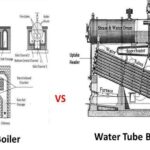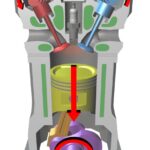
§ Fuels are any material that store potential energy in forms, which upon burning in oxygen liberates heat energy.
§ Calorific value of fuel is the total quantity of heat liberated when a unit mass or volume of fuel is completely burnt.
§ Higher or gross calorific value (HCV) in the total amount of heat produced when a unit mass/volume of fuel has been burnt completely and the products of combustion have been cooled to room temperature (15°C or 60°F).
§ Lower or net calorific value (LCV) is the heat produced when unit mass (volume) of the fuel is burnt completely and the products are permitted to escape.
LCV = HCV – Latent heat of water formed
§ Natural or primary fuels are found in nature such as wood, peat, coal, natural gas, petroleum.
§ Artificial or secondary fuels are prepared from primary fuels charcoal, coal gas, coke, kerosene oil, diesel oil, petrol, etc.
§ Fuels are further classified as
1. Solid Fuels
2. Liquid Fuels
3. Gaseous Fuels
Characteristics of solid fuels
1. Ash is high.
2. Low thermal efficiency
3. Form clinker
4. Low calorific value and require large excess air.
5. Cost of handling high
6. Cannot be used in IC engines.
Characteristics of liquid fuels
1. High calorific value
2. No dust ash and clinker
3. Clean fuels
4. Less furnace air
5. Less furnace space
6. Used in IC engines
Characteristics of Gaseous fuels
1. Have high heat content
2. No ash or smoke
3. Very large storage tanks are required
An ideal fuel should have the following properties:
1. High calorific value
2. Moderate ignition temperature
3. Low moisture content
4. Low NOn combustible matter
5. Moderate velocity of combustion
6. Products of combustion not harmful
7. Low cost
8. Easy to transport
9. Combustion should be controllable
10. No spontaneous combustion
11. Low storage cost
12. Should burn in air with efficiency.


